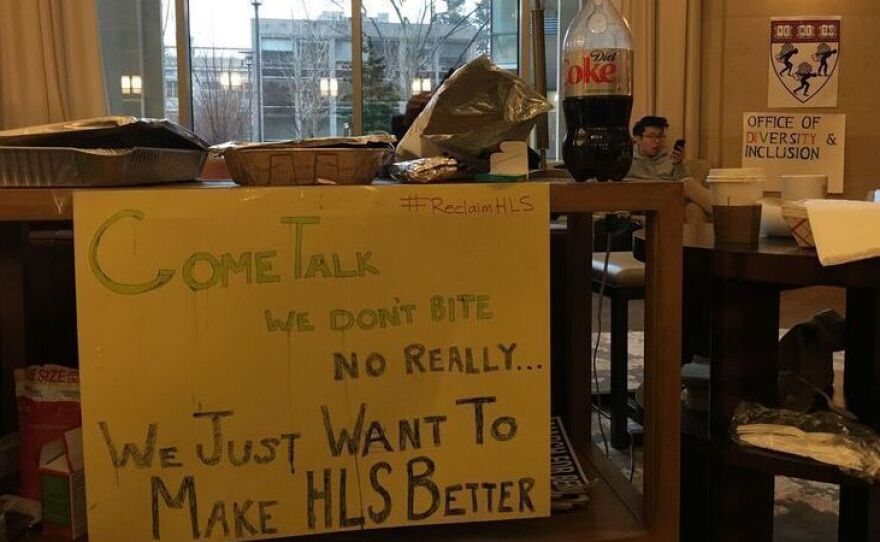
On Friday, the Dean of Harvard Law School, Martha Minow, endorsed a recommendation to change the school's official shield. That's because the shield contains the crest of Isaac Royall, a plantation owner, slave trader and justice of the peace from Antigua whose endowment of land helped establish the school. The recommendation came from a committee appointed by the Dean, but it was also one of several demands from a student group calling itself Reclaim Harvard Law, an organization that was part of a wave of protests that developed on campuses across the country last fall.
The Royall family shield — three sheaths of wheat on a blue background — was adopted by Harvard in 1936 as part of a dedication of arms across the disciplines to commemorate the university's 300th birthday. Getting rid of the crest is just one of several demands from a student group calling itself Reclaim Harvard Law School. That organization was part a wave of protest movements that swept campuses across the country last fall. The group — which has been occupying the Wasserstein Student Center for weeks — is happy about the shield recommendation. But they say it's not enough.
An Occupation With An Agenda, And A Guest List
The dozens of students occupying the center haven't clashed with campus security or barricaded themselves inside, though there are some sleeping bags and chairs pushed together for the protesters camped out here. They hold discussion groups, and invite guest speakers. On a recent night, Arab-American comedian Amer Zahr was riffing on the Census form. "There's a box that says 'Asian.' Now Arabs, we're Asian. But we know they don't mean us when they say Asian," he said. "And they tell you that they don't mean us, they write a whole list of examples: Korean, Japanese, Filipino, Vietnamese, Chinese, which sounds like the greatest food court, ever."
In addition to doing stand-up, Zahr is also a professor of law at the Detroit Mercy School, teaching a class in critical race theory.That's something members of Reclaim Harvard Law, like Keaton Allen-Gessesse want to hear in the classroom. "We've been asking for critical race theorists to come here and to be a part of the faculty, and those calls have gone ignored," she says. "We've been able to bring some here to speak to us and to teach us."
From History, A New Name
Isaac Royall Jr. inherited the estate of his father in 1739. The younger Royall effectively freed his slaves after fleeing Massachusetts due to his Loyalist connections during the Revolutionary War.
The students occupying the center have renamed it "Belinda Hall" after one of Royall Jr.'s slaves. Belinda Royall was left behind when he fled for England during the American Revolution. Allen-Gessesse recounts the story of how the formerly enslaved woman sued for compensation. "She petitioned the Massachusetts legislature for some sort of reparations and they granted her a pension," she says. "She's one of the first successful cases of reparations in this country."
Allen-Gessesse says that Belinda Royall should be honored this way. "We think it's a really beautiful story, it's a legal story, it's one that's tied to the school and we think that those are the types of stories that should really be memorialized here, rather than memorializing her enslaver," she says.
Harvard Law has confronted issues of diversity and racial tensions before:
- 1971 – Harvard Law School appoints Derrick Bell as its first African-American male tenured professor. Bell, who taught the then new course in civil rights law, and wrote the case book Race, Racism and American Law, is widely credited as one of the founders of critical race theory.
- 1983 – A student-faculty forum drew over 350 students to discuss affirmative action and curriculum reforms.
- 1986 – The Subcommittee on Discrimination and Administrative Matters finds through a survey that "[m]any students, especially women and minorities, continue to raise the importance of creating greater diversity in the faculty as a way to strengthen a climate of tolerance."
- 1987 – Latino students create a law journal, however Harvard does not allow use of the school's name until 1995.
- 1989 – Most multicultural student associations, along with groups representing women, LGBT community, disabled students and the National Lawyers Guild come together to make the Coalition for Civil Rights (CCR) at the school.
- 1990 – Harvard Law Professor Derrick Bell, the first tenured black member of the faculty, takes an unpaid leave of absence to demand the hiring of minority women in faculty.
- 1990 — Students file a lawsuit against Harvard University and Harvard Law School in Massachusetts Superior Court at the Middlesex County Courthouse in Cambridge. Eleven CCR members appear in court to argue that HLS engaged in discriminatory practices regarding the faculty hiring process.
- 1992 – Nine CCR members stage a sit-in in the hallway outside the Law School Dean's office to protest the lack of diversity in what would later be known as 'the Griswold 9 sit-in.' By the end of the protest, the nine were joined by 75 student supporters. The students involved were later publicly tried by the Administrative Board for their conduct.
- 1998 – Lani Guinier becomes the first woman of color appointed to a tenured professorship at Harvard Law School.
An Autumn Of Discontent And Demands
Racism at Harvard became a national headline again last November, when a vandal defaced the photographs of African American professors, putting black tape over their faces. But the students in the Reclaim movement are most passionate about institutional changes, such as further diversifying the faculty.
"They didn't need much black tape to cover up the faces of our professors," says student Cameron Clark, repeating a joke that circulated among students of color after the tape incident. Clark says that, prior to the occupation, Reclaim had meetings with the Dean Minow, and with Marcia Sells, the Dean of Students. "We went line by line on all of the different demands that we had," he says. "We were met with platitudes; [we] weren't really met with a definitive 'yes' or 'no,' on any or all of them."
The detailed list of demands include changes to the curriculum and faculty, new committees and offices that address diversity and inclusion, and making the school more affordable for disadvantaged students. Dean Marcia Sells believes school officials have been fair in addressing the demands. "The reality is many of them are things that students have been talking about for a while," she says. "So we're not looking at it from the context that 'we have to respond to demands,' but we are looking at, here are the things we have been doing." Dean Sells points to the school hiring a 'Director for Community Engagement and Equity,' conducting a comprehensive study of the climate on campus, and strengthening diversity training, among other things. Reclaim has not been satisfied with the response so far, and last month occupied the student center. But a lot of students don't agree with the agenda of the Reclaim movement, or their tactics. Sarah Gitlin is a third year student, and a self-described progressive who believes in racial justice, but thinks Reclaim is going about it the wrong way. "Instead of working with the administration, Reclaim has been fighting them, has been creating a really antagonistic environment," she says. "And so I think that a lot of students who are uncomfortable with certain portions of reclaim are genuinely afraid to speak out about it and at a law school that's devoted to a marketplace of ideas that's a real shame."
Right now, no one sees an end in sight to the protest. Reclaim Harvard Law School says the occupation of the student center will continue until their demands are met, and Dean Sells says the administration has no intention of kicking them out.
Copyright 2016 NPR. To see more, visit http://www.npr.org/.






